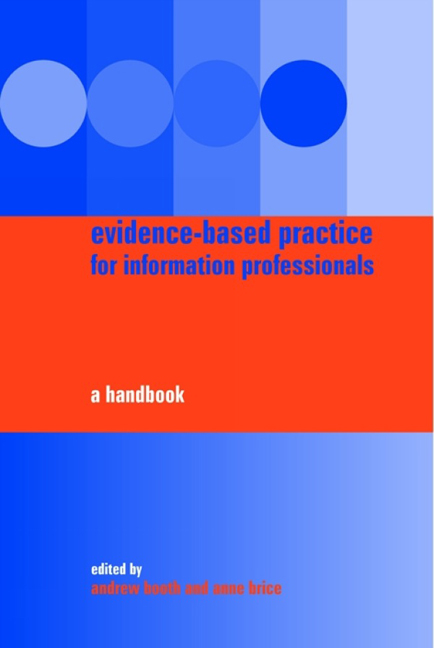Book contents
- Frontmatter
- Contents
- Foreword
- Editors and contributors
- Part 1 The context for evidence-based information practice
- Part 2 Skills and resources for evidence-based information practice
- Part 3 Using the evidence base in practice
- 13 Six domains of evidence-based information practice
- 14 Examining the evidence base for reference services and enquiry work
- Special Topic (A) Provision of a current awareness service for research staff (Guideline)
- 15 The contribution of evidence-based practice to educational activities
- Special Topic (B) How can I train my users? (Evidence Digest)
- 16 An evidence-based approach to collection management
- Special Topic (C) Electronic or paper: how do I manage my journals collection? (Evidence Digest)
- 17 Towards evidence-based management
- Special Topic (D) How do I measure the impact of my service? (Guideline)
- Special Topic (E) Should I charge and, if so, what should I charge for? (Evidence Briefing)
- 18 Evidence-based perspectives on information access and retrieval
- Special Topic (F) What are the characteristics of a good searcher? (Critically Appraised Topic)
- Special Topic (G) Which database, which interface? (Guideline) 251
- 19 Introducing an evidence-based approach to marketing and promotional activities
- Special Topic (H) Determining the information needs of practising nurses postregistration in the UK from 1990 to 2003 (Evidence Digest)
- 20 A future for evidence-based information practice?
- Index
Special Topic (C) Electronic or paper: how do I manage my journals collection? (Evidence Digest)
from Part 3 - Using the evidence base in practice
Published online by Cambridge University Press: 08 June 2018
- Frontmatter
- Contents
- Foreword
- Editors and contributors
- Part 1 The context for evidence-based information practice
- Part 2 Skills and resources for evidence-based information practice
- Part 3 Using the evidence base in practice
- 13 Six domains of evidence-based information practice
- 14 Examining the evidence base for reference services and enquiry work
- Special Topic (A) Provision of a current awareness service for research staff (Guideline)
- 15 The contribution of evidence-based practice to educational activities
- Special Topic (B) How can I train my users? (Evidence Digest)
- 16 An evidence-based approach to collection management
- Special Topic (C) Electronic or paper: how do I manage my journals collection? (Evidence Digest)
- 17 Towards evidence-based management
- Special Topic (D) How do I measure the impact of my service? (Guideline)
- Special Topic (E) Should I charge and, if so, what should I charge for? (Evidence Briefing)
- 18 Evidence-based perspectives on information access and retrieval
- Special Topic (F) What are the characteristics of a good searcher? (Critically Appraised Topic)
- Special Topic (G) Which database, which interface? (Guideline) 251
- 19 Introducing an evidence-based approach to marketing and promotional activities
- Special Topic (H) Determining the information needs of practising nurses postregistration in the UK from 1990 to 2003 (Evidence Digest)
- 20 A future for evidence-based information practice?
- Index
Summary
Question
To what extent should library and information services move from providing a physical printed journal collection to providing access to remote and distributed electronic journals?
Why is it important?
Initially librarians viewed e-journals as supplementary to the print title but increasingly a hybrid mix of journal formats is seen as complementary. Few library and information services have replaced print titles with an electronic-only option, arguing that their users expect easy, anytime, anywhere access (Goodman, 2002). Most examples are in the academic and corporate sectors. In asking whether ‘replacing print journals with electronic versions is either feasible or, indeed, desirable for the end-user’ this topic excludes associated issues regarding managing the serials acquisition process. It focuses on studies published between 2000 and 2002.
What is required?
Users are assumed to prefer electronic access to print resources. A small international survey of all types of libraries revealed relatively few standardized or best practices. A larger survey of all types of library users is required.
Likely cost consequences
It is frequently assumed that e-journals are cheaper to produce and distribute than paper counterparts. In reality, the cost of electronic-only subscriptions ranges considerably from between 85% and 115% of the paper price (Bevan et al., 2001). Another assumption is that availability of e-journals allows geographically separate sites/campuses to share the cost of single deals and reduce the cost of duplicating titles. In reality, this will depend on the definition of ‘site’ and access restrictions by individual publishers.
Publishers make it difficult for libraries to take electronic-only options (Bevan et al., 2001). At the present, the primary issue concerns the additional cost of obtaining electronic access over and above the existing print subscription. Online access can range from being completely free and unrestricted to costing up to 50% more and with various access restrictions.
Drexel University, which has moved to purchase only the electronic version whenever possible, has not yet proven that converting to the electronic version lowers costs over paper versions. The universities per title subscription costs are lower for e-journals, but the University has maintenance costs. Although several mainly clerical tasks were eliminated, new tasks were created for more highly skilled staff (Montgomery, 2000). Despite the costs of binding and physically storing paper archives, electronic archiving still has ‘considerably higher’ costs (Drewes and Guzi, 2001).
- Type
- Chapter
- Information
- Evidence-based Practice for Information ProfessionalsA Handbook, pp. 196 - 199Publisher: FacetPrint publication year: 2004



